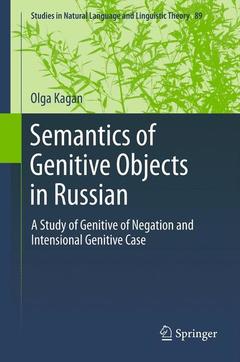Description
Semantics of Genitive Objects in Russian, 2013
A Study of Genitive of Negation and Intensional Genitive Case
Studies in Natural Language and Linguistic Theory Series, Vol. 89
Author: Kagan Olga
Language: English
Subject for Semantics of Genitive Objects in Russian:
Keywords
Definite objects; Definiteness and DOM in other languages; Desiderative predicates; Differential object marking; Directive predicates; Epistemic predicates; Fiction predicates; GenNeg Assignment to Specific and Definite NPs; Genitive objects and perfective verbs; Intensional genitive; Irrealis Genitive in Negative Contexts; Negative concord items; Non-canonical genitive case; Partitive genitive; Russian linguistics; Subjunctive mood; Weak intesional predicates; case alternations; genitive of negation; intensional predicates
186 p. · 15.5x23.5 cm · Paperback
Description
/li>Contents
/li>Comment
/li>
Abbreviations .- Acknowledgements .- Preface . 1. Introducing the Problem: Structural Case Alterations . 2. Outline of the Book . 3. Methodology, Data and Judgments .- Chapter 1. 1.1 Genitive Objects and the Inherent/Structural Distinction .- Chapter 2. 2.1. The Configurational Approach.- Chapter 3. 3.1. Subjunctive Mood: An Introduction .- Chapter 4. 4.1. Non-Semantic Factors . Chapter 5. 5.1. Preview: The Importance of REC .- Chapter 6. 6.1. Irrealis Genitive in Negative Contexts .- Chapter 7. 7.1. Aspect and Number Affect Case-Assignment .- Chapter 8. 8.1. Differential Object Marking .- Conclusion .- Bibliography.




